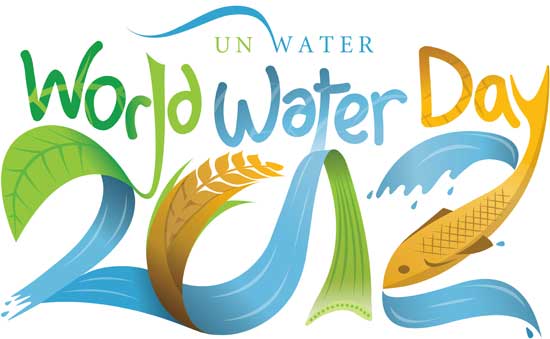 Have you ever thought about where the water you drink, cook with or bathe in comes from? Access to clean water is central to our well-being. It is a critical resource necessary for survival, contributing to human health, nourishment, irrigation and transportation. When we turn on the faucet or shower or flush a toilet, we often don’t think about the possibility of water being a scarce resource.
Have you ever thought about where the water you drink, cook with or bathe in comes from? Access to clean water is central to our well-being. It is a critical resource necessary for survival, contributing to human health, nourishment, irrigation and transportation. When we turn on the faucet or shower or flush a toilet, we often don’t think about the possibility of water being a scarce resource.
United Nations World Water Day, recognized annually on March 22, aims to highlight the importance of the sustainable management of freshwater resources. The theme for 2012 is “Water and Food Security,” emphasizing the connection between better access to clean water and lower levels of famine, undernourishment and food shortages. As competition for water and food across the world increases, conservation of precious resources becomes more important.
Consider the following facts about water and food security around the world:
- Water scarcity already impacts every continent and more than 40 percent of the people on our planet. By 2025, 1.8 billion people will be living in countries or regions with absolute water scarcity, and two-thirds of the world’s population could be living under water-stressed conditions.
- There are more than 7 billion people to feed on the planet today, with another 2 billion expected by 2050. This population increase means that 70 percent more food will be needed and up to 100 percent in developing countries.
- It takes nearly 800 gallons of water to produce enough food to satisfy a person’s daily needs. Each person drinks anywhere from 0.5 to 1 gallon of water every day. However, most of the water we consume is embedded in the food we eat, meaning that wasted food equates to wasted water.
- It takes 396 gallons of water to produce about two pounds of wheat. It takes 10 times more water (3,960 gallons) to produce the same amount (two pounds) of beef! Producing feed crops for livestock, slaughtering and the processing of meat, milk and other dairy products also require large quantities of water.
Did you know about these water conservation projects at Vanderbilt?
- Plant Services and Plant Operations plumbing shops’ have retrofitted thousands of water-saving bathroom fixtures on the main campus and in the medical center, which result in an estimated water savings of more than 30 million gallons and $175,000 each year.
- Plant Operations continues to capture nonpotable groundwater that collects in utility tunnels beneath campus to irrigate the athletic fields and for use in the on-campus cogeneration power plant cooling towers. By capturing this water and redirecting it, Vanderbilt is reducing water purchases from Metro Water and Sewer by an additional 50 million gallons per year.
- Plant Services has implemented condensation recycling in MRB III, which takes water from the air and redirects it to the facility’s cooling towers rather than sending it down the drain. The project saves an estimated $32,000 and 2.5 million gallons of water each year.
If you’d like to do your part on World Water Day, here are several suggestions for conserving water and food waste:
- Turn off the water when it is not in use.
- Wash full, rather than partial, loads of lab ware, dishes or clothes in cold water, which also saves energy, whenever possible.
- In residential environments, take efficient showers and turn off the water when brushing your teeth. Consider using a shower timer to gauge the amount of time you actually spend in the shower each day.
- Don’t purchase, order or take food that you won’t eat. Wrap up any leftovers in your own reusable to-go container to enjoy later, or consider freezing leftovers for a future meal.
- Purchase food items that have been produced sustainably utilizing practices that are environmentally friendly, healthy, ethical to both humans and animals and supportive of farming communities. Look for items produced locally without pesticides, chemical fertilizers, factory farming, hormones and non-therapeutic use of antibiotics.
- Try eating vegetarian for a meal – you might like it! Production of meat can be resource intensive, consuming fossil fuels, water and land and creating pollution and greenhouse gas emissions.
For more information about World Water Day 2012, visit the United Nations World Water Day website. For more information about Vanderbilt’s sustainability program, visit SustainVU, become a fan of SEMO’s SustainVU Facebook page, or contact SEMO at SustainVU@vanderbilt.edu or (615) 322-2057.
Contact: SustainVU, (615) 322-2057
SustainVU@vanderbilt.edu